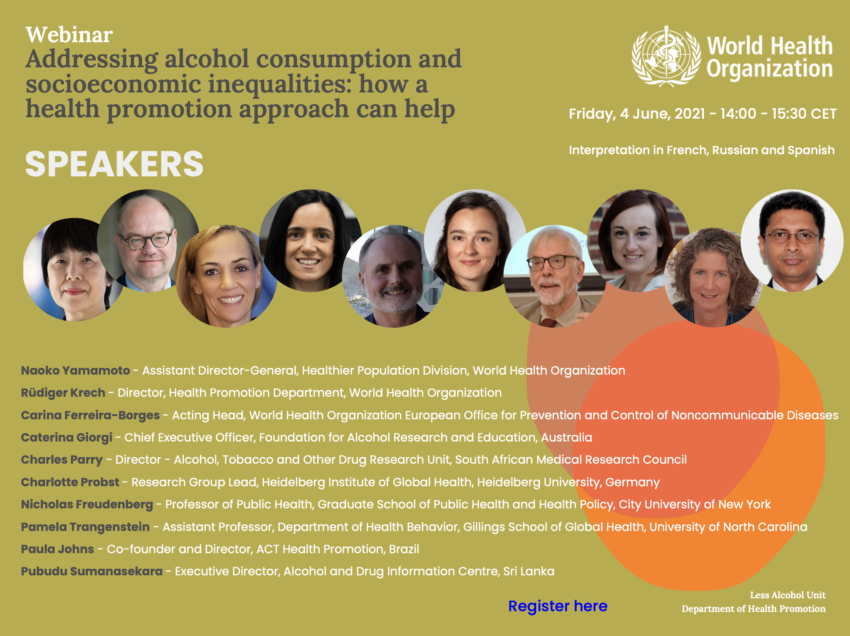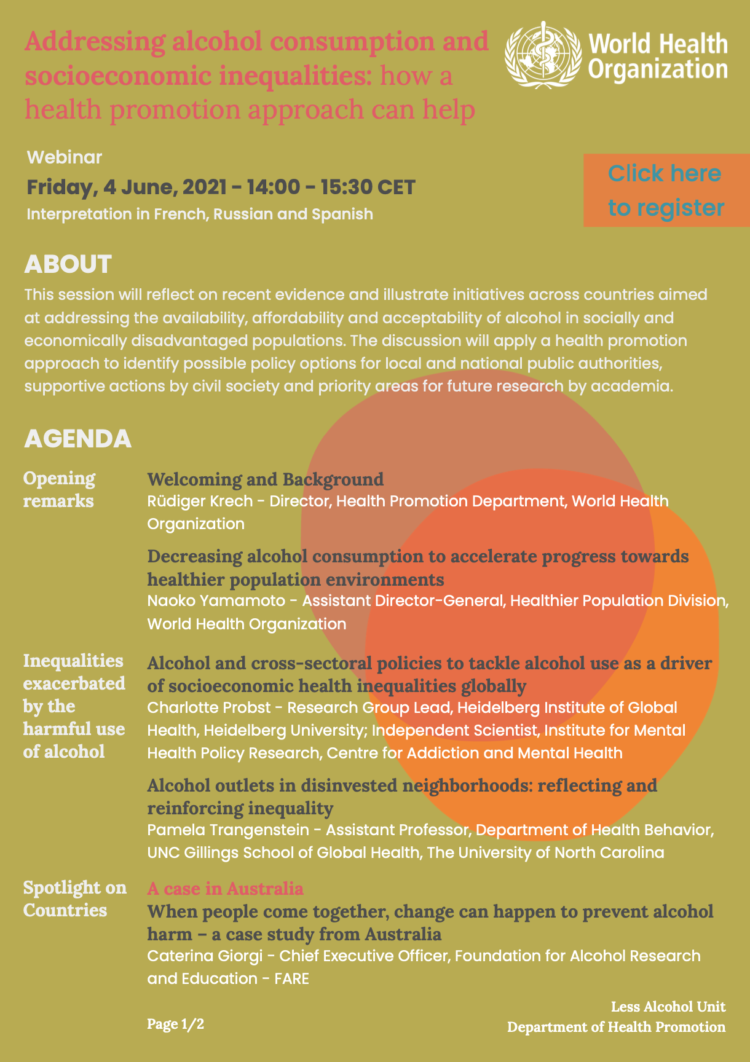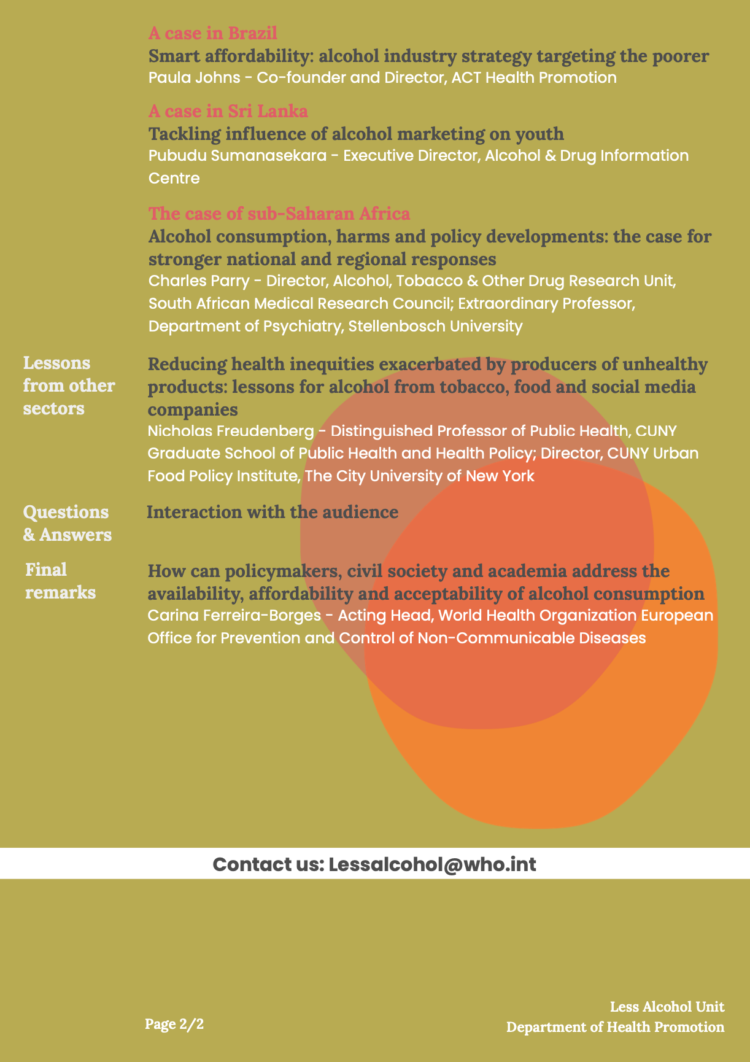
- This event has passed.
Jun 4 '21, 2:00 PM - 3:30 PM
ADDRESSING ALCOHOL CONSUMPTION AND SOCIOECONOMIC INEQUALITIES:
HOW A HEALTH PROMOTION APPROACH CAN HELP
This webinar is organized by the Less Alcohol unit of the health promotion department in the healthier populations division at the World Health Organization. It is part of the “Less Alcohol Health Promotion Webinar Series”.
Interpretation
Simultaneous interpretation is available in French, Russian and Spanish.
Date
June 4, 2021
Time
14:00 – 15:30 CET
Place
WHO’s Zoom platform
Concept
Evidence has consistently found higher vulnerability towards alcohol harm among those with lower socioeconomic status. Alcohol consumption – especially heavy episodic alcohol use – explains nearly 27% of the socioeconomic inequalities in mortality. As countries progress in their development, alcohol consumption may exacerbate disparities in the burden of disease attributable to alcohol.
Inequalities related to the harm produced by alcohol consumption are associated to multiple determinants, including the greater co-occurrence of obesity, smoking, lack of exercise, mental health problems, communicable diseases such as tuberculosis and HIV/AIDS, increased exposure to life stressors as well as the reduced access to and use of health services and social supports.
The easy availability of alcohol, e.g. higher density of alcohol outlets in disadvantaged neighbourhoods; its increasing affordability, e.g. cheaper alcohol produced with local crops targeting populations in emerging markets and subgroups of unrecorded alcohol and the cultural acceptability, e.g. elevated number of alcohol advertisements in deprived communities are documented drivers increasing the divide across population groups.
Models of policy interventions have shown that increasing alcohol taxes in New York City would proportionally benefit more the lowest income groups by reducing consumption and related violence. New zoning in Baltimore would reduce spaces available to alcohol outlets by 27.2%, mainly in high poverty areas. Moreover, reducing the number of alcohol outlets by one quintile would potentially result in fewer homicides and disability-adjusted life years.
In Scotland, the introduction of minimum unit price resulted in less alcohol purchased by lower-income households. In England, brief interventions to reduce high-risk alcohol use were delivered in primary care more often to economically disadvantaged groups, potentially contributing to a reduction in socioeconomic inequalities in health.
This session will reflect on recent evidence and illustrate initiatives across countries aimed at addressing the availability, affordability and acceptability of alcohol in socially and economically disadvantaged populations. The discussion will apply a health promotion approach to identify possible policy options for local and national public authorities, supportive actions by civil society and priority areas for future research by academia.
Program and speakers
Download the provisional program, here.
OPENING REMARKS
“Decreasing alcohol consumption to accelerate progress towards healthier population environments”
- Naoko Yamamoto, Assistant Director-General, Healthier Population Division, World Health Organization
- RüdigerKrech, Director, Health Promotion Department, World Health Organization
SPEAKERS
Download the list of speakers, here.
- Charlotte Probst, Research Group Lead, Heidelberg University, Independent Scientist, Centre for Addiction and Mental Health
- Nicholas Freudenberg, Distinguished Professor of Public Health, The City University of New York
- Pamela Trangenstein, Assistant Professor, The University of North Carolina
- Carina Ferreira-Borges, Head, World Health Organization Office for Prevention and Control of Noncommunicable Diseases, Russian Federation
SPOTLIGHT ON COUNTRIES
Sub‐Saharan Africa countries
- Charles Parry, Director, South African Medical Research Council, Extraordinary Professor, Stellenbosch University, South Africa
Australia
- Caterina Giorgi, Chief Executive Officer, Foundation for Alcohol Research and Education
Brazil
- Paula Johns, Co-founder and Director, ACT Health Promotion
Sri Lanka
- Pubudu Sumanasekara, Executive Director, Alcohol and Drug Information Centre
Registration
Please follow the link to register, here.
Download the event flyer
You can download the event flyer, here.



